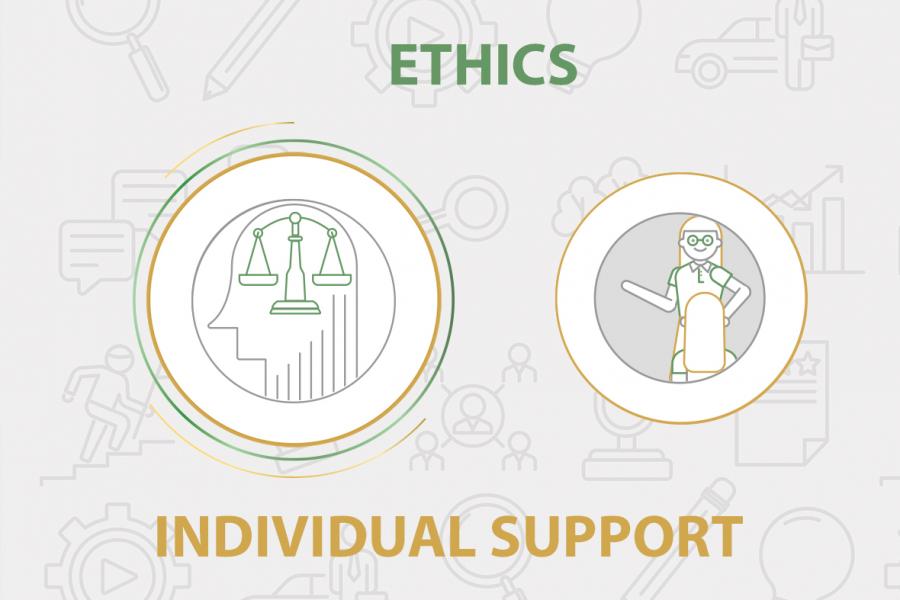 Ethical Behaviour -CDP Levels
Ethical Behaviour -CDP Levels
Understanding ethical issues related to different Career Development Practitioner levels.
Ethical Behaviour - CDP Levels
Case Study
Steve is a career development officer at a local NGO. He is passionate about giving information to learners as they embark on lifelong learning paths. Steve admits that he lacks the necessary training required to perform such a task and was appointed because of his passion and extensive knowledge about careers and courses. He is super friendly and has casual relationships with learners. Learners think of him as the big brother they can go to when in need of information. He not only provides career information but guidance on personal relationships and issues. He recently accepted a fancy pair of headphones as a token of appreciation for the service he offered. The NGO did not commonly charge people, neither in cash nor kind. One will often see Steve hanging around with learners on the premises, sometimes he plays soccer with them, sometimes a game of cards. He even has braais on weekends and invites learners over. Steve believes that he is providing a genuine service in extending himself to youngsters and this keeps them out of trouble.
- Career-related enquiries, educational institution information and financial aid, trending careers, learning programmes, entry requirements for tertiary educational institutes, labour market, job availability.
- Information regarding the National Qualification Framework (NQF) and Occupational Framework for Occupations (OFO).
- An ELCDP is able to search, collect, evaluate and assimilate career-related information and is able to refer clients to several different sources for information. The ELCDP is able to facilitate information-sharing sessions with individuals and groups.
- Provide career advice and guidance, apply career development theories and decision-making models.
- Administer non-standardised assessments and assist clients in understanding the results of these assessments in relation to their personal circumstances.
- By working with the client, the ALCDP is able to develop career and study options and co-design a plan of action with the client, based on the options.
- Help clients become employable by assisting clients in developing their Curriculum Vitaes, auditing the quality of applications, preparing for interviews, job searching skills, networking and self-branding. The ALCDP works with individuals and groups.
- Career guidance and counselling, career development research or executive coaching and course content development.
- Training for career development practitioners.
- Conduct, score and interpret psychometric tests.
- Outreach centre developers as determined by the relevant professional body from time to time.
- Unethical behaviour has the potential to harm both the client and the practitioner. It can negatively affect the reputation, credibility and registration of the career development practitioner. Unethical conduct or behaviour can also result in legal action against the practitioner.
- Teaching others about the key tenets of the Code as understanding the concepts offers greater insight into the Ethical Code.
- Creating or thinking of an ethical dilemma a practitioner could face, then applying the Ethical Code and standards to that dilemma to try to resolve the issue.
- Ethical behaviour is an everyday practice. Career development practitioners need to become proficient with the Ethical Code and Standards. Doing so will help practitioners expand their knowledge and understanding of this field.
- Take additional refresher courses.
- Career development practitioners are under obligation to respect the human worth and dignity of every person to whom services are rendered. This means that career practitioners accept that individuals have a right to make their own choices, to take responsibility for those choices, to engage in self-development and to maintain confidentiality.
- Career practitioners are obligated to provide equal opportunities without prejudice to persons of different educational backgrounds, gender, race, ethnicity, disability, or religion, and to avoid all forms of discrimination. Career practitioners are not to harass or judge a client in any way.
- Confidentiality is of paramount importance in the field of career development, however in certain situations it is considered acceptable to release confidential information. These include situations where:
- A practitioner has been subpoenaed or ordered by a court of law to disclose information.
- The individual or client involved is at risk of harming themselves or others.
- A practitioner intends to explore a case with a fellow professional for supervision purposes.
- Career practitioners must accept that clients are the experts or authority in their own lives. For this reason, a practitioner should not dictate or impose what is the best or most appropriate choice for a client, they should not offer advice and should not portray themselves as an expert with all the answers.
- Practitioners are advised against giving career support to friends and co-workers as this could influence the objectivity of the practitioner.
Shared under a Creative Commons Attribution-NonCommercial-NoDerivatives 2.0 South Africa (CC BY-NC-ND 2.0 ZA)
This means you can share and adapt this work but not for commercial purposes. You will only need to include the following reference to the original content in all shared works.
Kindly attribute as follows:
Beukes, C. J., Mahadave, K., & Kanhai, K. (2022). Professional Development Portfolio for Career Development Practitioners (1st ed.). CC BY-NC-SA 2.0 ZA, https://creativecommons.org/licenses/by-nc-nd/2.0/za/
Authors
![]() Karuna Mahadave
Karuna Mahadave
![]() Christopher John Beukes
Christopher John Beukes

You can earn 1.00 CPD point/s by completing and passing the self-assessment questionnaire for this article.
1.00